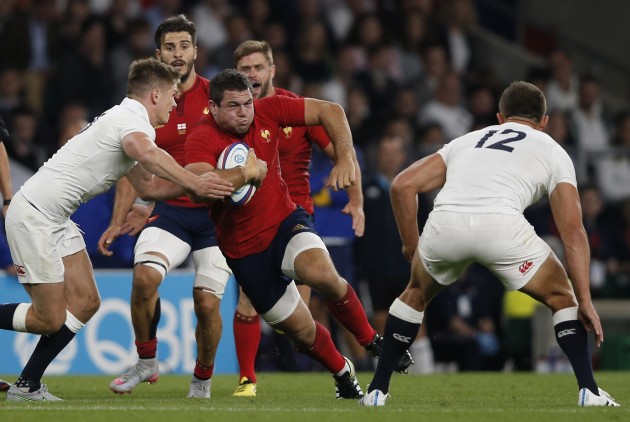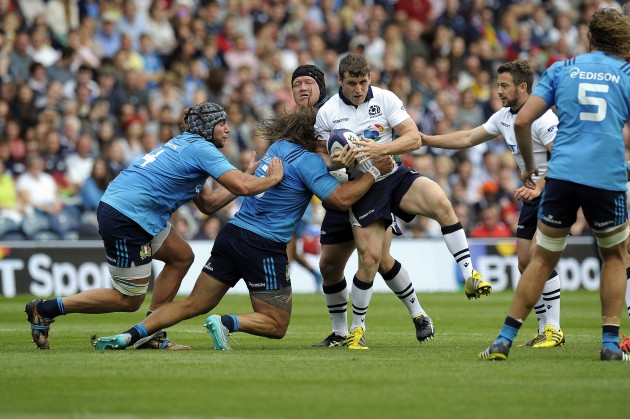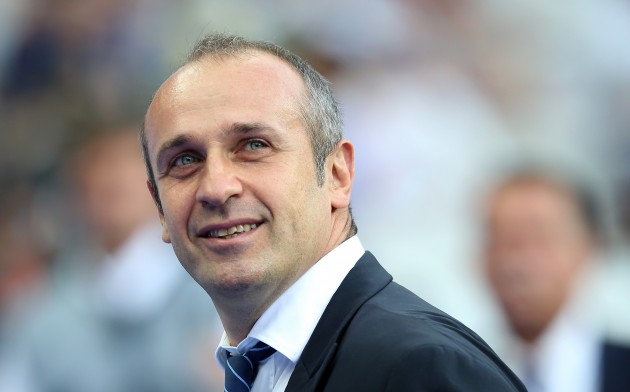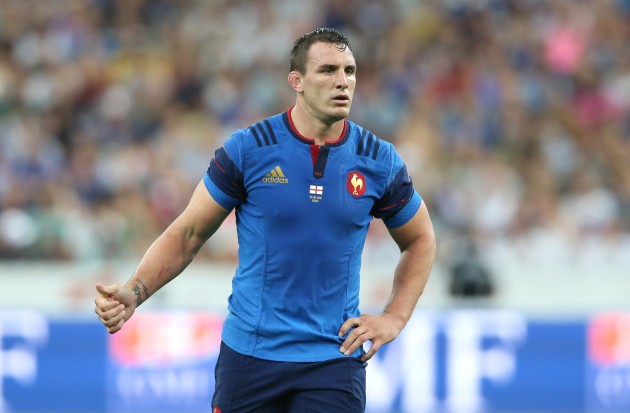Scotland will present an awkward challenge to France on Saturday evening. Awkward because only a dominant victory will do for the French public, who are still on a high after Les Bleus‘ battering of England last month. They want more of the same, and they’ll expect it against a Scottish side who last won in Paris in 1999.
They’ll expect to see a similarly bullying display in the scrum, more pilfering of opposition ball at the line-out and Freddie Michalak will be expected to kick his goals and orchestrate his backline. If France do despatch the Scots with the same clinical confidence they showed against England then they’ll head into the World Cup on a high, and that should worry their rivals.
The draw has been favourable to the French. They kick-off their campaign at Twickenham on September 19 against Italy, who, judging by their sorry display against Scotland on Saturday, won’t present much of a problem to Philippe Saint-Andre’s side. Then it’s Romania and Canada, tough opponents but unlikely to mount a serious challenge to France. Their final group game is against Ireland on Sunday October 11.
France haven’t beaten Ireland during Saint-Andre’s reign but if they are unbeaten when they meet in six weeks, the French will be favourites to progress to a likely quarter-final against Argentina.
There was little flamboyance in France’s two performances against England last month (they scored two tries to England’s five) but if Saint-Andre learned one thing during his 69-cap Test career, it was that flamboyance doesn’t win titles. Yes, it wins you admiration – too many people have asked him about his try against England in 1991 or his part in the ‘Try from the End of the World’ against New Zealand three years later – but you can’t display flamboyance on the mantelpiece.
PSA’s Test career ran from 1990 to 1997, an era of unprecedented English dominance in northern hemisphere rugby. Will Carling’s side won three Grand Slam titles and reached a World Cup final, while France were busy running the ball from inside their own 22. PSA played against England six times in the Five Nations and won just once. He also played in the 1991 World Cup quarter-final, a match of chilling ferocity, in which England’s victory was built on the indomitability of their pack. England reached the final that year playing rugby that could hardly be called captivating, despite the presence of Jeremy Guscott and Rory Underwood, two of the most creative threequarters of their generation. Instead England bludgeoned their way to the final, scoring just two tries in the quarter-, semi- and final.
PSA has assembled a pack to do a similar job. Nicolas Mas is his Jeff Probyn, a grizzled tight-head happiest with his head in the scrum. Eddy Ben Arous will play the role of Jason Leonard, a young loose-head still learning his craft but possessed of strength, energy and aggression. Guilhem Guirado has much in common with Brian Moore: not the biggest hooker but mobile, precise and a leader of men.
Pascal Pape and Yoann Maestri are every bit as bruising as Wade Dooley and Paul Ackford, big, hard men who enjoy combat and perform their second-row duties with grim efficiency.
PSA’s likely first-choice back-row will be Louis Picamoles at No8 with Damien Chouly and Thierry Dusautoir on the flanks. Not the most creative but then neither was England’s 1991 loose forward trio of Mike Teague, Mick Skinner and Peter Winterbottom. They were more destructive than constructive, using their muscle to out-ruck and out-maul the opposition, and tackle them into the ground with a bone-shuddering intensity.
Over the years France have illuminated the World Cup with moments of exquisite panache – their 1987 semi-final defeat of Australia, coming back to beat New Zealand in the 1999 World Cup and stunning the All Blacks again eight years later. But despite their bouts of brilliance the Webb Ellis Cup has remained out of reach. PSA is carrying on the work of Bernard Laporte, the first France coach to understand that the old French way was incompatible with professional rugby. Sides were fitter, defences tighter and the days of playing by thrilling instinct were over. Laporte began the transformation following France’s ignominious defeat to England in the 2003 World Cup semi-final. For many seasons he was criticised and told France would never beat England at their own game, and over the last decade England have had the best of the encounters. But England have been steadily moving away from their traditional game, a transition facilitated by the expansive style of the Aviva Premiership. The Top 14 in contrast is still set-piece dominated; the season is also longer and matches more physically draining with players given little time to recover for Test matches – hence why France’s results have suffered in recent seasons.
But the France squad are now in an unusual position – they are fit, fresh and invigorated. The first-choice pack is also vastly experienced with an average of 30, one year more than the England ‘Dad’s Army’ pack that won the 2003 World Cup.
It’s taken Saint-Andre four years to work out his best pack, although he hasn’t been helped in the last 12 months by a combination of illness (Picamoles), suspension (Pape) and injury (Dusautoir and Ben Arous) . But suddenly PSA’s plans are coming together, and this most Anglophone of French coaches is increasingly confident he can win a World Cup on English soil playing in the old English style.








